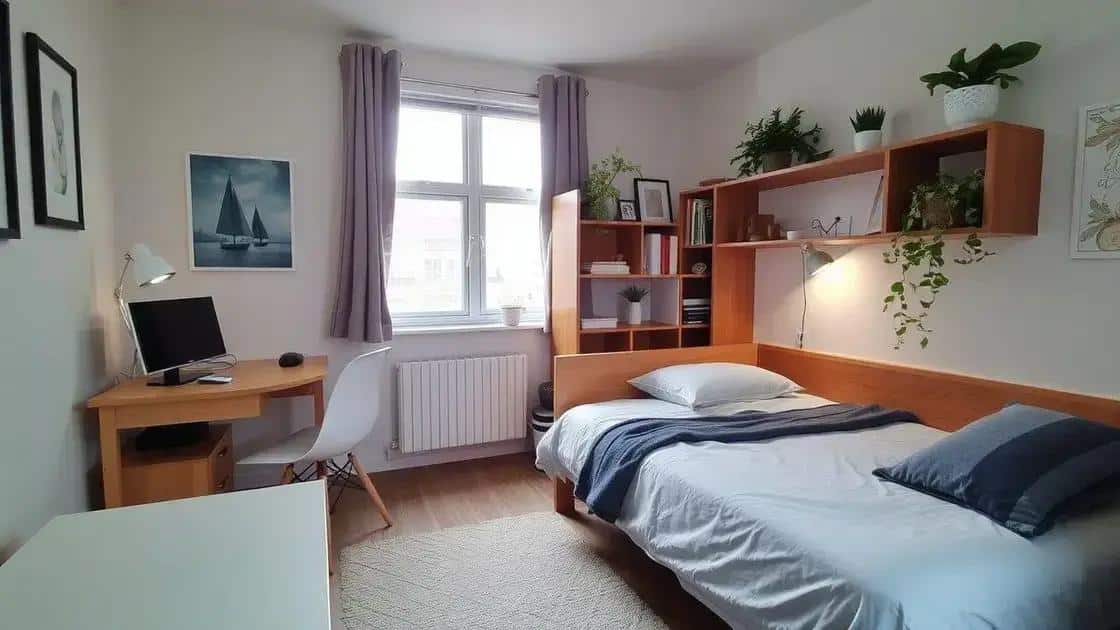University student housing solutions: affordable options

Navigating lease agreements as a student involves understanding key lease terms, knowing your rights, carefully inspecting the property, and ensuring all agreements are documented to protect your interests.
When it comes to university student housing solutions, finding the right place can feel overwhelming. With various options available, it’s essential to explore what works best for your lifestyle and budget. Are you ready to discover how to secure your ideal living situation?
Understanding university housing options
Understanding university housing options is crucial for students. Whether you are new to college or transferring, knowing what is available can ease your transition. There are several types of housing to consider.
Types of University Housing
Universities typically offer a variety of living arrangements to suit different needs and budgets. Some common choices include:
- On-campus dorms: These are popular among first-year students. Living on campus means being close to classes and resources.
- Shared apartments: For students looking for more independence, shared or private apartments can be a great option.
- Off-campus housing: Many students choose to live off-campus, seeking places closer to their lifestyle or budget.
- Fraternities and sororities: For those interested in Greek life, these houses offer a unique living experience with a community atmosphere.
In addition to these choices, it’s essential to consider factors like cost, amenities, and the location of the housing. Many students find that on-campus options are more expensive, but they offer advantages, such as being part of the campus community.
Finding the Right Fit
As you search for a place to live, think about what you value most in a student housing setup. Is it social interaction? Independence? Cost efficiency? It’s important to list your priorities before making a decision.
Ask yourself questions like:
- What is my budget for rent?
- Do I want to share a room or have my own space?
- How important is it for me to be near the university?
Connecting with other students can also provide valuable insights into available housing options. They might suggest hidden gems that aren’t widely advertised.
In summary, understanding all your university housing options is key to making a well-informed decision. Explore what fits your lifestyle and budget to ensure a successful college experience.
Tips for finding affordable student housing

Finding affordable student housing can be a challenging task, but with the right strategies, it becomes much easier. Here are some effective tips to help you locate budget-friendly options.
Start Your Search Early
Timing is important when looking for housing. Start your search at least a few months before classes begin. This gives you more options and prevents the stress of last-minute decisions.
Use Online Resources
There are many websites and apps specifically designed for student housing. Utilize these resources to explore listings that fit your budget.
- University housing portals: Many universities have their own housing platforms.
- Rental websites: Websites like Craigslist, Zillow, or Apartments.com can provide abundant options.
- Social media groups: Join local groups for students on platforms like Facebook.
Additionally, don’t underestimate the power of word-of-mouth. Ask peers, seniors, or academic advisors if they know of any available housing.
Consider Different Locations
Sometimes living slightly farther from campus can save you a lot of money. Explore neighborhoods around your university. Public transportation or biking options can make commuting easy even from farther areas. Look for places that offer good access to transit routes.
Another option is to consider sharing a house or apartment with roommates. This not only splits rent but can also lower costs for utilities.
Inspect Before You Commit
Always visit potential housing options in person if possible. Check for cleanliness, safety, and amenities. Make sure everything meets your expectations before signing any lease agreements.
Ask about any additional costs as well. Sometimes a low rent might have hidden fees that need to be examined closely.
By following these tips, you can navigate the housing market more effectively. Finding affordable student housing is attainable with some preparation and research.
The benefits of shared accommodation
Shared accommodation offers numerous advantages for students looking for affordable housing. Choosing to live with others can not only save money but also enhance your university experience.
Cost-Effective Living
One of the most significant benefits of shared accommodation is the reduced cost. Splitting rent and utilities among roommates makes living more affordable for each individual.
- Lower rent: Renting a larger space can be cheaper per person than living alone.
- Shared utilities: Dividing costs like electricity and internet can help you stay within your budget.
- Grocery savings: Buying groceries in bulk and sharing meals can minimize individual expenses.
By sharing your living space, you can also access larger apartments or houses that may be financially out of reach individually.
Enhanced Social Experience
Living with others creates opportunities for social interaction. This can lead to friendships and support systems that make your college days memorable.
Having roommates means always having someone to hang out with or study alongside. This can make dealing with academic challenges easier since you have companions to share experiences with.
Learning Valuable Life Skills
Getting used to living with others involves navigating personal differences. In shared accommodation, you’ll learn how to communicate effectively and resolve conflicts. These are valuable skills that will benefit you throughout life.
Additionally, managing shared responsibilities like cleaning and cooking fosters a sense of teamwork that prepares you for future situations, both professional and personal.
Convenience and Location
Many shared accommodations are located near campus, making commutes shorter and more accessible. Living in a group often allows you to choose a neighborhood that offers great amenities.
You’ll likely find that living close to friends enhances your university experience. This convenience can lead to more study groups and social activities, promoting a balanced lifestyle.
In summary, choosing shared accommodation provides financial benefits, fosters social connections, and enriches personal growth. These advantages make it a popular choice for many university students.
Navigating lease agreements as a student

Navigating lease agreements can be challenging for students. Understanding the important details helps ensure a smooth housing experience. Here are some key points to consider.
Understanding Lease Terms
Before signing any agreement, it’s essential to read through the lease carefully. Focus on the following terms:
- Lease duration: Know how long you are committing. Most student leases are for a year, but some may be shorter.
- Rent amount: Check the monthly rent and understand when it’s due.
- Deposit: Most leases require a security deposit. Learn how much it is and the conditions for getting it back.
Understanding these terms will help you avoid surprises later on. If anything seems unclear, don’t hesitate to ask the landlord for clarification.
Rights and Responsibilities
As a tenant, you have specific rights and responsibilities. Familiarize yourself with local tenant laws to know what you can expect:
- Right to a safe environment: Your landlord must maintain a livable space, fixing serious health or safety issues promptly.
- Obligation to pay rent: Timely payment is essential. Late payments may lead to fees or eviction.
- Notice before entering: Landlords should give you notice before entering your rental property for repairs or inspections.
Being aware of these rights and rules promotes a better tenant-landlord relationship. Always communicate openly and respectfully.
Inspecting the Property
Before moving in, it’s wise to inspect the property thoroughly. Make sure everything is in good condition. Look for:
- Signs of damage: Note any existing issues and report them before signing the lease.
- Utilities: Test appliances to ensure they are working properly.
- Cleanliness: Make sure the space is clean and ready for you to move in.
Having documentation of the property’s condition protects you from charges for damages you didn’t cause when you move out.
Get Everything in Writing
Always request a written copy of your lease agreement. This document serves as your reference throughout your tenancy. If any changes arise, such as updates to the terms, ensure they are written down and signed by both parties.
Staying organized with your lease documents can help you avoid misunderstandings and maintain a smooth rental experience. By understanding the lease agreement and your rights, you can confidently navigate this important aspect of student housing.
In summary, navigating lease agreements as a student involves understanding key terms, knowing your rights, and carefully inspecting your living space. By familiarizing yourself with these aspects, you can avoid pitfalls and create a positive living experience. Always remember to communicate openly with your landlord and keep everything in writing. This approach not only protects you but also allows you to enjoy your university life fully.
FAQ – Frequently Asked Questions about Navigating Lease Agreements as a Student
What should I look for in a lease agreement?
Focus on the lease duration, rent amount, security deposit, and any additional fees to avoid surprises.
What are my rights as a tenant?
You have the right to a safe living environment, the right to timely repairs, and the right to privacy from your landlord.
How can I ensure my security deposit is returned?
Document the condition of the property upon moving in and report any damages to your landlord immediately.
Is it important to get everything in writing?
Yes, having written records of agreements and changes helps prevent misunderstandings and protects your rights.






